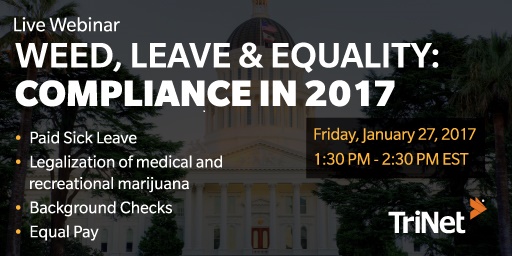Key HR Regulations You Should Keep in Mind While Planning 2017, Part 2

Small and midsize businesses know that human resources (HR) rules and regulations can change frequently which is why compliance is a key area of concern. 2017 brings many changes, including a new administration in the White House starting Jan. 20. Many in the HR community predict that the new administration will also bring a host of regulatory changes that could impact you and your business. In this two-part series, we have compiled a list of key issues that you should keep an eye on as you plan for 2017.
Mandatory retirement savings
On September 28, 2016, California passed a law that will eventually require that all businesses with five or more employees that do not already offer a retirement plan enroll their workers in a new type of savings plan based on IRAs. California joins an increasing group of states, including Connecticut, Maryland, Oregon and Illinois, that have passed legislation to implement a mandatory retirement plan requirement for employers (size varies by state). Since 2012, at least 30 states have considered proposals to review or establish state-required saving plans.
These states require employers to offer a retirement plan to their employees or participate in state-run plans. Employers who offer a retirement plan already comply with these laws. It is also important to note that these laws do not require employers to contribute to the plan, but do put the administrative burden on the employers.
Merely offering access to a retirement plan will keep your company in compliance and allow you to avoid creating the infrastructure to facilitate auto-enrollment of your employees into state-run plans. This is true even if none of your employees choose to contribute to the company retirement plan.
Offering retirement plans has the added benefit of employee retention— more than 60 percent of employees whose employer doesn’t offer a retirement plan said they would likely leave their current job for a nearly identical position that offered one.
Discrimination in the workplace
Discrimination suits are an increasingly challenging concern for SMBs. The potential for discrimination claims can start at recruitment and have significant effects on your business. During the fiscal year 2016 (ending September 30), 97,443 discrimination charges were filed with the Equal Employment Opportunity Commission (EEOC) and $482.1 million was awarded to the claimants in those cases. This was a 6.5 percent increase from charges filed in 2015.
In its Strategic Enforcement Plan, the EEOC described disability discrimination, pregnancy discrimination, sexual orientation discrimination and religious accommodation as “emerging and developing issues” that the agency will focus on as “national priorities.” There are several grounds for filing discrimination cases and some of the most common claims are based on gender, race, sexual orientation, gender identity, pregnancy and religion.
Ban the box legislation
This type of legislation prevents prospective employers from requiring applicants to answer a question, or check a box, that indicates a criminal record. Background checks typically can only be run after an offer of employment has been extended and specific factors must be met in order to withdraw an offer after the background verification. The prospective employer usually is required to provide a copy of the background check to the applicant and inform them of their right to appeal.
This legislation may affect your recruitment practices as states and municipalities pass regulations to help those with criminal records find gainful employment. So far, 24 states and 25 major cities and counties have adopted similar legislation. The EEOC favors banning the box so its adoption may increase with time.
If you have questions about these regulations, don’t hesitate to contact your TriNet representative for assistance.
For more information join our webinar:
This communication is for informational purposes only; it is not legal, tax or accounting advice; and is not an offer to sell, buy or procure insurance.
This post may contain hyperlinks to websites operated by parties other than TriNet. Such hyperlinks are provided for reference only. TriNet does not control such web sites and is not responsible for their content. Inclusion of such hyperlinks on TriNet.com does not necessarily imply any endorsement of the material on such websites or association with their operators.







